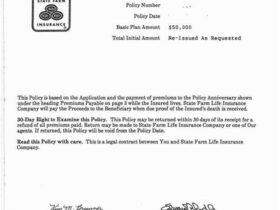Insurance is a safety net designed to protect you financially from unexpected events. But understanding the process of actually using that safety net – filing an insurance claim – can be confusing. This guide will break down what an insurance claim is, how to file one, and what to expect during the process. Whether it’s for your home, car, or health, knowing your rights and responsibilities is crucial for a smooth and successful claim.
What is an Insurance Claim?
At its core, an insurance claim is a formal request to your insurance company for compensation for a loss or event covered by your policy. This “loss” could be anything from damage to your car after an accident, damage to your home from a storm, medical bills from an injury, or even the loss of personal belongings due to theft. The claim initiates a process where the insurance company investigates the incident, assesses the damage, and determines whether the claim is valid based on the terms and conditions of your insurance policy. In essence, it’s you, the policyholder, asking your insurer to fulfill their contractual obligation to provide financial protection as outlined in your insurance agreement.
Types of Insurance Policies and Claims
Different types of insurance policies cover different risks. Here are some common examples:
Homeowners Insurance: This covers damage to the interior and exterior of your house, as well as loss or damage to your personal belongings. It typically covers events like fire, wind damage, vandalism, and theft. Flood or earthquake damage usually requires separate policies. If a hurricane damages your roof, siding, or personal property, you would file a claim under your homeowner’s insurance (and potentially a separate flood insurance policy, if applicable).
Auto Insurance: This provides financial protection if your vehicle is damaged, stolen, or involved in an accident. It can cover damage to your car, medical expenses, and liability if you’re at fault in an accident. Car insurance claims are filed after collisions, theft, or damage from other events like hail or vandalism.
Health Insurance: This helps pay for medical treatments, hospital stays, and other healthcare expenses. Claims are filed to cover doctor’s visits, surgeries, prescriptions, and other medical services.
Life Insurance: Life insurance provides a payout to beneficiaries upon the death of the insured person. This payout can help cover funeral expenses, debts, and provide financial support to loved ones.
Understanding the specific coverage provided by your policy is crucial. Carefully review your policy documents to know what’s covered, what’s excluded, and what your policy limits are. Policy limits refer to the maximum amount the insurance company will pay for a covered claim.
Filing an Insurance Claim: A Step-by-Step Guide

Filing an insurance claim can seem overwhelming, but breaking it down into steps can make the process more manageable.
Report the Incident Promptly: As soon as you become aware of a loss or damage, contact your insurance company. Most policies require you to notify them as soon as possible. Delaying notification could affect your claim. If a crime is involved, report it to the police and obtain a crime reference number.
Document the Damage: Take photos and videos of all property damage before making any temporary repairs. This documentation will serve as evidence for your claim. Be as thorough as possible, capturing all angles and details of the damage.
Prevent Further Damage: Take reasonable steps to prevent further damage to your property. For example, if a window is broken, cover it with a tarp to protect your home from the elements. Keep receipts for any temporary repairs, as these expenses may be covered by your policy.
Review Your Policy: Understand what’s covered and what your responsibilities are. Pay close attention to your deductible, which is the amount you must pay out-of-pocket before the insurance company starts covering the remaining costs.
Complete the Claim Form: Your insurance company will provide you with a claim form, either online or on paper. Fill it out accurately and completely, providing all requested information and supporting documents. Missing or incorrect information can delay the process.
Cooperate with the Insurance Company: Respond promptly to any requests for information from the insurance company. They may want to inspect the damage, interview you, or request additional documentation.
What to Expect During the Claims Process

Once you’ve filed a claim, the insurance company will investigate the incident and assess the damage. This may involve:
Claim Acknowledgement: The insurance company should acknowledge receipt of your claim within a specified timeframe (e.g., 14 days).
Investigation: The insurance company will investigate the claim to determine the cause of the damage and whether it’s covered by your policy. This may involve a site visit from a loss adjuster, who will assess the damage and prepare a report.
Claim Decision: The insurance company will then decide whether to approve or deny your claim. If approved, they will provide a settlement offer.
Settlement Negotiation: If you disagree with the settlement offer, you can negotiate with the insurance company. Provide additional evidence to support your case, such as repair estimates or appraisals.
Dealing with Claim Denials or Disputes

Insurance companies can deny claims for various reasons, such as the damage not being covered under the policy, the damage amounting to less than the deductible, or inaccuracies in the claim details. If your claim is denied, you have the right to appeal the decision.
Request a Written Explanation: Ask the insurance company to provide a written explanation of why your claim was denied.
Review Your Policy: Carefully review your policy documents to see if the denial is justified based on the terms and conditions.
Gather Additional Evidence: Collect any additional evidence that supports your claim, such as expert opinions or appraisals.
File a Formal Complaint: If you believe the denial is unfair, file a formal complaint with your insurance company.
Seek Legal Assistance: If you’re unable to resolve the dispute with the insurance company, consider consulting with an insurance attorney.
The Importance of Understanding Your Policy
The key to a successful insurance claim is understanding your policy. Take the time to read and understand the terms and conditions, coverage limits, exclusions, and deductible. If you have any questions, contact your insurance agent or company representative for clarification.
Understanding “policy limits” is especially crucial. For instance, dwelling coverage pertains to the structure of your home (walls, roof, floors), while personal property coverage pertains to your belongings (furniture, electronics, clothing). Make sure your policy limits are sufficient to cover the full replacement cost of your home and belongings.
Filing an insurance claim can be a complex process, but by understanding your rights and responsibilities, documenting everything carefully, and communicating effectively with your insurance company, you can navigate the process successfully and receive the compensation you deserve. Insurance is there to protect you in times of need, so make sure you’re prepared to utilize it effectively.






Leave a Reply